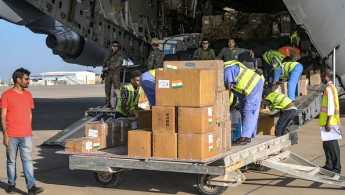Shaky Sudan truce holds on for second day as donors set to meet in Geneva
An international donors' conference is set to begin in Geneva on Monday for Sudan, where a ceasefire was holding but the UN says the humanitarian situation is worsening after two months of war.
The conference comes mid-way through a three-day ceasefire which appeared to have brought calm to the capital Khartoum, after the failure of earlier truces to ensure secure aid corridors.
Several Khartoum residents told AFP they heard no air strikes, artillery or other fighting on Monday, a rare respite for the war-weary suffering shortages of medical care, electricity, water and other essentials.
The army, led by Abdel Fattah al-Burhan, has since April 15 been battling the paramilitary Rapid Support Forces (RSF) commanded by his former deputy Mohamed Hamdan Daglo, after the two fell out in a power struggle.
Across the country, the death toll has topped 2,000, the Armed Conflict Location and Event Data Project said.
Hundreds of kilometres (miles) west of Khartoum, up to 1,100 have been killed in the West Darfur state capital El Geneina alone, according to the US State Department, blaming "primarily" the RSF.
A record 25 million people - more than half Sudan's population - are in need of aid, according to the United Nations, which says it has received only a fraction of desperately needed funding.
Roughly 2.5 million people have been uprooted across Sudan by the war, which has forced around 550,000 to seek refuge in neighbouring countries, the International Organization for Migration said.
Monday's conference, which is set to open in the Swiss city at 3:00 pm (1300 GMT), is to address the aid needs both in Sudan and in neighbouring countries, now bearing an increased burden.
The UN will convene the event with Egypt, Saudi Arabia, Qatar, the African Union and the European Union.
Donors are expected to announce financial commitments to address the humanitarian crisis "and reiterate the need for the parties to the conflict in Sudan to adhere to their obligations under International Humanitarian Law," the UN Office for the Coordination of Humanitarian Affairs said in a statement.
It said less than 16 percent of the needed $2.6 billion for aid response has been funded, while the regional refugee response plan for $470 million is similarly underfunded.
With farm fields left fallow because of fuel and other shortages during the war, the UN's Food and Agriculture Organization said Monday it urgently needs more than $95 million to reach 15 million people.
Despite the lack of money, the looting of aid facilities and the killing of humanitarian workers, aid agencies have increased their response to the tragedy but, according to UN figures, only a fraction of those in need have been reached.
William Carter, Sudan director for the Norwegian Refugee Council, said bureaucratic delays are also hindering the aid response.
On Twitter, he said about 100 visa applications are still pending from more than 30 organisations.
"We've had a team of 20 on standby for over a month - we could've helped 200,000 displaced by now," Carter said on the eve of the aid conference.
"It's clear that humanitarian access is impeded but unclear if it's indecision or intention," he added.
The UN, African Union and east African regional bloc IGAD, in a joint statement ahead of the donors' meeting, expressed particular concern about "the rapidly deteriorating situation in Darfur where the conflict has taken on an ethnic dimension, resulting in targeted attacks based on people's identities and subsequent displacement of communities".
On Thursday UN Under-Secretary-General Martin Griffiths said Darfur is "rapidly spiralling into a humanitarian calamity."
The western region on Sudan's border with Chad has never recovered from a years-long war that began in 2003 when then-strongman Omar al-Bashir unleashed the Janjaweed militia in response to a rebel uprising.
The RSF have their origins in the Janjaweed, whose actions led to international charges of genocide, war crimes and crimes against humanity.
With their 72-hour ceasefire both the RSF and army "agreed to allow the unimpeded movement and delivery of humanitarian assistance throughout the country", US and Saudi mediators said on Saturday.
The mediators repeated a previous warning that they would consider adjourning talks should the truce not be respected.
On Monday, Sudan again accused Kenya - at the head of an IGAD-appointed quartet tasked with resolving the crisis - of being an unfit mediator.
In its latest such statement, Khartoum's army-aligned foreign ministry objected to Kenya's "describing the conflict in Sudan as a struggle between two generals."




 Follow the Middle East's top stories in English at The New Arab on Google News
Follow the Middle East's top stories in English at The New Arab on Google News

![A group of Palestinians, foreign and Israeli activists gather to participated in an olive picking event on the land in the town of Battir, which is under threat of confiscation by Israel in Bethlehem, occupied West Bank on 8 November 2024. [Getty]](/sites/default/files/styles/image_330x185/public/2182930803.jpeg?h=199d8c1f&itok=__0LgGsa)
